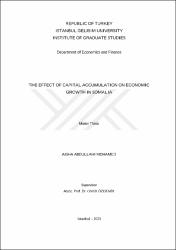| dc.contributor.author | Mohamed, Aisha Abdullahi | |
| dc.date.accessioned | 2023-05-22T06:59:37Z | |
| dc.date.available | 2023-05-22T06:59:37Z | |
| dc.date.issued | 2023 | en_US |
| dc.identifier.uri | https://hdl.handle.net/11363/4668 | |
| dc.description | Danışman: DOÇ. DR. ONUR ÖZDEMİR
Yer Bilgisi: İstanbul Gelişim Üniversitesi / Lisansüstü Eğitim Enstitüsü / Ekonomi ve Finans Bilim Dalı
Konu: Ekonomi = Economics | en_US |
| dc.description.abstract | Bu çalışma, 1989'dan 2020'ye kadar Somali 'de sermaye birikimi ve ekonomik büyümenin etkisini incelemektedir. Bir ekonomik model oluşturmak ve verileri değerlendirmek için OLS modelinin ekonometrik teknikleri kullanılmıştır. Tüm değişkenler için birim kök testi yapılmış, tüm değişkenler düzeyde durağan değil, birinci fark modelinde durağan çıkmıştır. Johnson eş bütünleşme testi test edilmiş ve GSYİH, sermaye, ihracat, tasarruf ve döviz kuru değişkenleri arasında en az bir eş bütünleşme olduğu bulunmuştur. Çalışma, Somali'de sermaye birikimi ile ekonomik büyüme arasında uzun vadeli pozitif bir etki olduğunu ortaya çıkardı. Bu araştırma çabasındaki ampirik bulgular ve sermaye birikiminin Somali Ekonomisindeki ekonomik büyüme üzerindeki etkisi üzerine inşa edilmiştir. Devletin yeterince seferber etmesi ve reel sektöre uygun kullanım için tahsis etmesi ve yerli ve yabancı yatırımcıların talebini karşılayabilecek iyi bir proje sistemi oluşturması gibi bir politika önerisi yapılmıştır. | en_US |
| dc.description.abstract | This study examines the consequence of capital accumulation on economic growth in Somalia from 1989 - 2020. To create an economic model and assess the data, econometric methods of the OLS model were utilized. All variables underwent the unit root test, and some of them were discovered not to be stationary in the first difference model, but they are all stationary at the second level. An experiment of the Johnson co-integration hypothesis revealed that there is at least one co-integration between the variables of GDP, gross capital formation, export, saving, and exchange rate. The study set up a strong long-term correlation between Capital Accumulation and Economic Growth in Somalia. The research effort's empirical findings were created on the impact of capital accumulation on the expansion of the Somali economy. A policy recommendation was made such as government should sufficiently mobilize enough and allocate to the real sector for appropriate use and they must shape a good project system that is capable to meet up the demand of domestic and foreign investors. | en_US |
| dc.language.iso | eng | en_US |
| dc.publisher | İstanbul Gelişim Üniversitesi Lisansüstü Eğitim Enstitüsü | en_US |
| dc.rights | info:eu-repo/semantics/openAccess | en_US |
| dc.rights | Attribution-NonCommercial-NoDerivs 3.0 United States | * |
| dc.rights.uri | http://creativecommons.org/licenses/by-nc-nd/3.0/us/ | * |
| dc.subject | GDP | en_US |
| dc.subject | gross capital formation | en_US |
| dc.subject | export | en_US |
| dc.subject | saving | en_US |
| dc.subject | exchange rate | en_US |
| dc.subject | GSYİH | en_US |
| dc.subject | brüt sermaye oluşumu | en_US |
| dc.subject | ihracat | en_US |
| dc.subject | tasarruf | en_US |
| dc.subject | döviz kuru | en_US |
| dc.title | The effect of capital accumulation on economic growth in Somalia | en_US |
| dc.title.alternative | Somali'de sermaye birikiminin ekonomik büyümeye etkisi | en_US |
| dc.type | masterThesis | en_US |
| dc.department | Lisansüstü Eğitim Enstitüsü | en_US |
| dc.relation.publicationcategory | Tez | en_US |



















